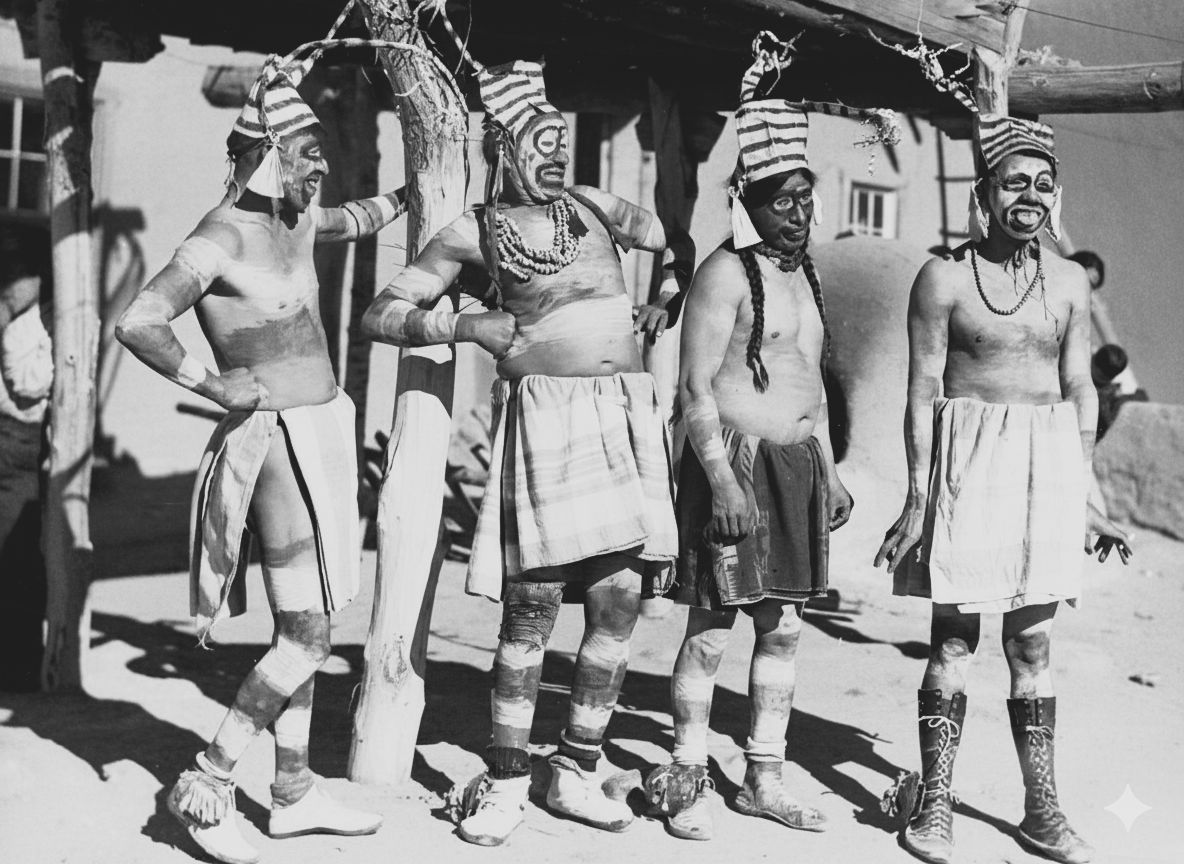🌀 The Decode
You see the screenshot. Someone said something terrible or perhaps just thoughtless, and now 47,000 people are quote-tweeting their outrage. You add your own comment. It feels good. Righteous, even. By morning, the person has been fired. And their Wikipedia page treats them like a figure from the past.
You scroll past.
This ritual of mass condemnation occurs daily now, but we rarely question what we're truly doing. We call it accountability. We call it consequences. But remove the smartphones, and it resembles something humans have practised for thousands of years: using shame to sustain the tribe's rules.

Four Kossa Clowns, San Juan Pueblo," Ohkay Owingeh, NM. Photograph by T. Harmon Parkhurst. Courtesy of Princeton University Library. Source: Mathiowetz, M. D. (2025). KIVA, 91(2), 147–179.
🏺 Field Notes
In Hopi communities in Arizona, there is a striking ritual of public correction. Clowns, their bodies painted with black-and-white clay stripes, perform ceremonies in which they mock community members who have violated tribal norms.
In the 1990s, anthropologist Peter Whiteley of the American Museum of Natural History witnessed one of these events, where the clowns targeted a bootlegger named Cricket, who had been selling alcohol within the community. The clowns acted like exaggerated drunks stumbling around, tossing bottles, and turning Cricket into the object of communal ridicule.
But here's what makes it different from what we do online: The shaming was time-bound, a day or two of ridicule. It targeted the behavior, not Cricket's identity. And crucially, the ritual included a path to forgiveness. Both the clowns and the shamed could receive formal pardons. Cricket returned to the tribe in good standing, though everyone kept watching.
The Hopi understood something we've forgotten. Shame works as a correction tool only when there's a way back in.
Colonial America used similar tactics, such as stocks (wooden restraints that held people in place for public humiliation), pillories (wooden frames that locked the head and hands), and public whippings. These practices were phased out in the 1830s, not because towns grew too large, but because people began demanding compassion. For nearly 180 years, Western societies have moved away from public shaming as a form of punishment.
Then came X.
🧩 First Principles
The philosopher Martha Nussbaum spent years examining what she calls "primitive shame", a shame directed not at specific actions but at human imperfection itself. In her book Hiding from Humanity: Disgust, Shame, and the Law, she argues that shame is inherently hierarchical. It creates ranks of human beings, dividing the pure from the contaminated, the acceptable from the outcast.
This is important because shame doesn't only punish; it also leaves a mark. It establishes a lasting underclass of the disgraced.
Nussbaum warns that disgust and shame in public policy threaten democratic values precisely because they prevent us from seeing each other as equally vulnerable, equally flawed humans. When we shame, we're trying to distance ourselves from our own imperfection by projecting it onto someone else.
She observed that shame is "associated with a desire to hide from our humanity, embodying an unrealistic wish to be invulnerable." We shame others to prove we're not like them. We're better. We're safe.
But we're not. And that's the psychological trap of cancel culture: it lets us believe that if we just identify and exile the bad people, we'll never become them.
🏙️ The Agora
Cancel culture, the practice of withdrawing support and calling for collective ostracism, has exploded as a research topic, with academic publications surging in 2021 during the pandemic. A 2024 study on Gen Z behavior found that 97% will unsubscribe or unfollow accounts they want to "cancel," and 94.68% will block or mute them.
The targets are familiar. Singer Lizzo faced cancellation in 2023 after dancers accused her of harassment, particularly painful since she'd been celebrated as a body-positive icon. Rapper Drake's image suffered in his 2024 feud with Kendrick Lamar, who accused him of inappropriate relationships with minors. The "Blockout 2024" movement targeted celebrities for silence on Gaza, calling itself the "digital guillotine."
But here's what's changed: Cancel culture is fading. Once-cancelled figures like Andrew Cuomo are running for office. Chris Brown got Grammy nominations. Shane Gillis sold out tours.
Why? Because platforms like X and Instagram have loosened their moderation policies. Audiences now have shorter attention spans. Additionally, people have realised that having a loyal following effectively makes you uncancellable. If you've got "stans", people who live and breathe by you, you can withstand anything.
The ritual remains. But the permanent exile? That's proving more challenging to enforce than we thought.
⚡ Signals
📜 Quote: "The snowflake never needs to feel responsible for the avalanche." —Jon Ronson, So You've Been Publicly Shamed
📊 Study: A 2024 scientometric review of cancel culture research from 2016 to 2023 showed a surge in publications during COVID-19. Five key themes were identified: deplatforming, cultural conflicts, links with politics and popular culture, issues of racism and consequences, and celebrity cancellations.
🎨 Artifact: The phrase "You're cancelled" itself borrowed from a 1991 scene in New Jack City where a crime boss says "Cancel that bitch," then popularized on Black Twitter in the 2010s as a way for marginalized voices to hold influential figures accountable.
😂 Meme: When someone gets cancelled and immediately posts "I'm taking time to listen and learn" like they're downloading an empathy software update.

🤔 Prompt: Have you ever participated in a pile-on and later felt uncomfortable about it? What changed?
📝 Reader's Agora
Here's what we’re curious about: We all know the feeling of adding our voice to a collective condemnation. Sometimes it feels justified. Sometimes, looking back, it feels like we got swept up in something.
Reply and tell us where the line is between accountability and mob justice? When does calling someone out become stacking them into the digital stocks?
🎯 Closing Note
The Hopi clowns understood that shame needs limits. Time-bound. Behavior-focused. Path to redemption. Our digital version lacks these barriers.
Perhaps it's because we've confused the feeling of participation with the pursuit of justice. It's easier to take a screenshot and criticise than to think carefully about what we truly want to happen next. Do we want this person to learn? To lose everything? To never speak again?
The answer matters because when the avalanche arrives for you and history suggests it eventually comes for everyone who speaks publicly, you'll want to know what you have built.
Subscribe to Culture Decoded for weekly insights on modern behavior.

